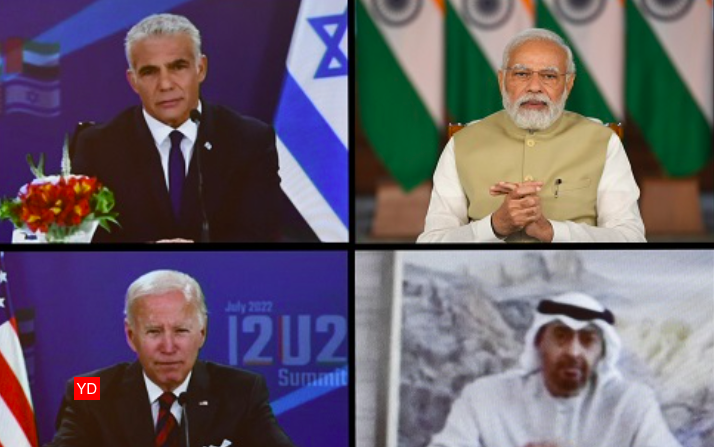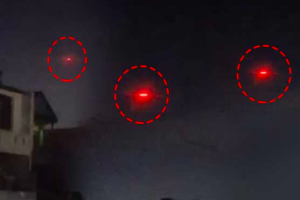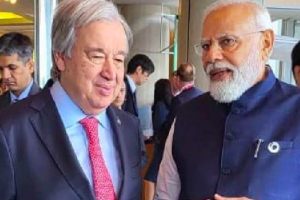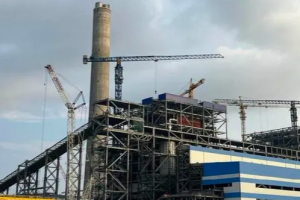The first projects of the I2U2 will be located in India and help with agriculture, food and green energy, according to the joint statement of the four leaders after the group’s launch.
Indian Prime Minister Narendra Modi along with his Israeli counterpart Yair Lapid and UAE President Sheikh Mohammed bin Zayed Al Nahyan along with the US President Joe Biden launched the Middle East Quad known as “I2U2” from the initials of the participants.
The UAE will invest $2 billion in the agriculture and food project that aims to “maximise crop yields and, in turn, help tackle food insecurity in South Asia and the Middle East,” the statement said on Thursday.
Biden claimed that the project that will utilise US and Israeli expertise “has the potential to sustainably increase India’s food yield in the region threefold in just five years”.
Gujarat will be the beneficiary of the 300 megawatt wind and solar energy programme and projects like that “have the potential to make India a global hub for alternate supply chains in the renewable energy sector,” the statement added.
Speaking through a videolink from India, Modi said, “The I2U2 has established a positive agenda from its very first summit on Thursday.”
“We have identified joint projects in several areas and have also made a roadmap to take them forward,” he added.
The I2U2 will work in six areas — water, energy, transport, space, health and food security — combining the expertise and the resources of the four nations, Modi said.
With political and strategic divergences among the four countries, the emphasis was on economic and technical cooperation.
Unlike in the Indo-Pacific region, where the other Quad of India — the US, Japan and Australia — face direct aggressive conduct by China, in the Middle East the challenge for I2U2 is from China’s Belt and Road initiative to extend its power more subtly through predatory lending and trade practices.
The US President, who was present in person with Lapid in Jerusalem for the launch, said, “The first two projects that we’re tackling together on food security and clean energy are designed to take on two of the most urgent crises affecting people around the globe: food insecurity.”
“Our nations represent some of the most innovative, technologically capable, and entrepreneurial people on the planet,” he added.
The mobilisation of the strength of the I2U2 nations can be seen in the two projects in India.
UAE will invest $2 billion in the agriculture and food project, and the US and Israeli private sectors will lend their expertise while India will provide the land facilitating farmers’ integration into food parks, the joint statement said.
The project will “develop a series of integrated food parks across India that will incorporate state-of-the-art climate-smart technologies to reduce food waste and spoilage, conserve fresh water and employ renewable energy sources,” it added.
For the $330 million Gujarat wind solar electricity project that is to be complemented by a battery energy storage system, UAE-based companies are exploring opportunities to serve as “critical knowledge and investment partners,” the statement said.
The US Trade and Development Agency has funded a feasibility study for it and the US and Israel are to work with the UAE and India to highlight private sector opportunities, it added.
“Indian companies are keen to participate in this project and contribute to India’s goal of achieving 500 GW of non-fossil fuel capacity by 2030,” it said.
UAE President said that he wanted to “emphasise the importance of giving priority during the coming time to research and development, healthcare and space”.
Among the future projects mentioned is providing vaccines — something that has been a focus area for the other Quad in the Indo-Pacific.
While putting the spotlight on food and energy security, the joint statement laid out an ambitious agenda ranging from infrastructure for better physical connectivity in the region to financing start-ups, with waste treatment in between.
The I2U2 statement detailed them: “We intend to mobilise private sector capital and expertise to modernise infrastructure, advance low carbon development pathways for our industries, improve public health and access to vaccines, advance physical connectivity between countries in the Middle East region, jointly create new solutions for waste treatment, explore joint financing opportunities, connect our startups to I2U2 investments, and promote the development of critical emerging and green technologies, all while ensuring near- and long-term food and energy security.”

























Add Comment